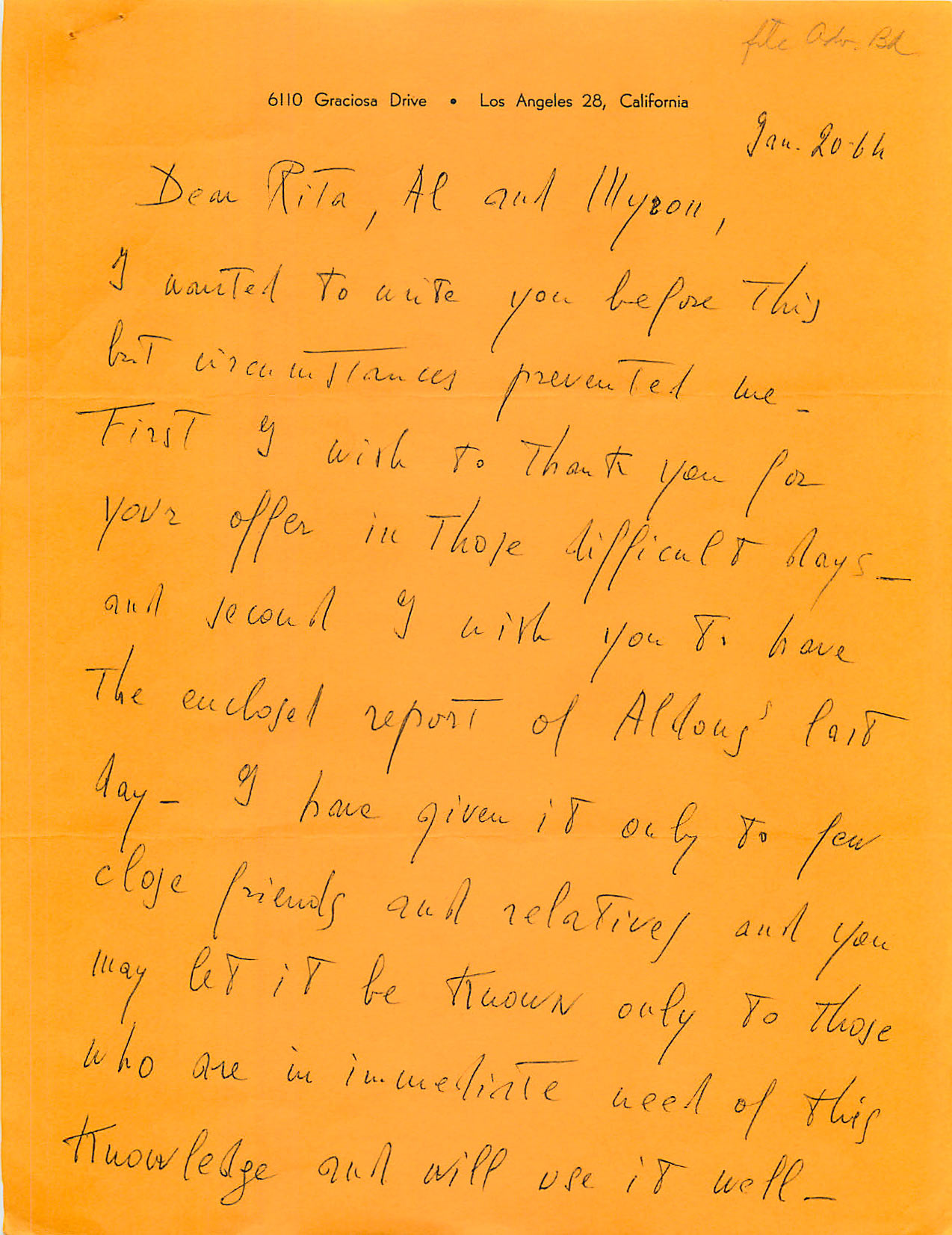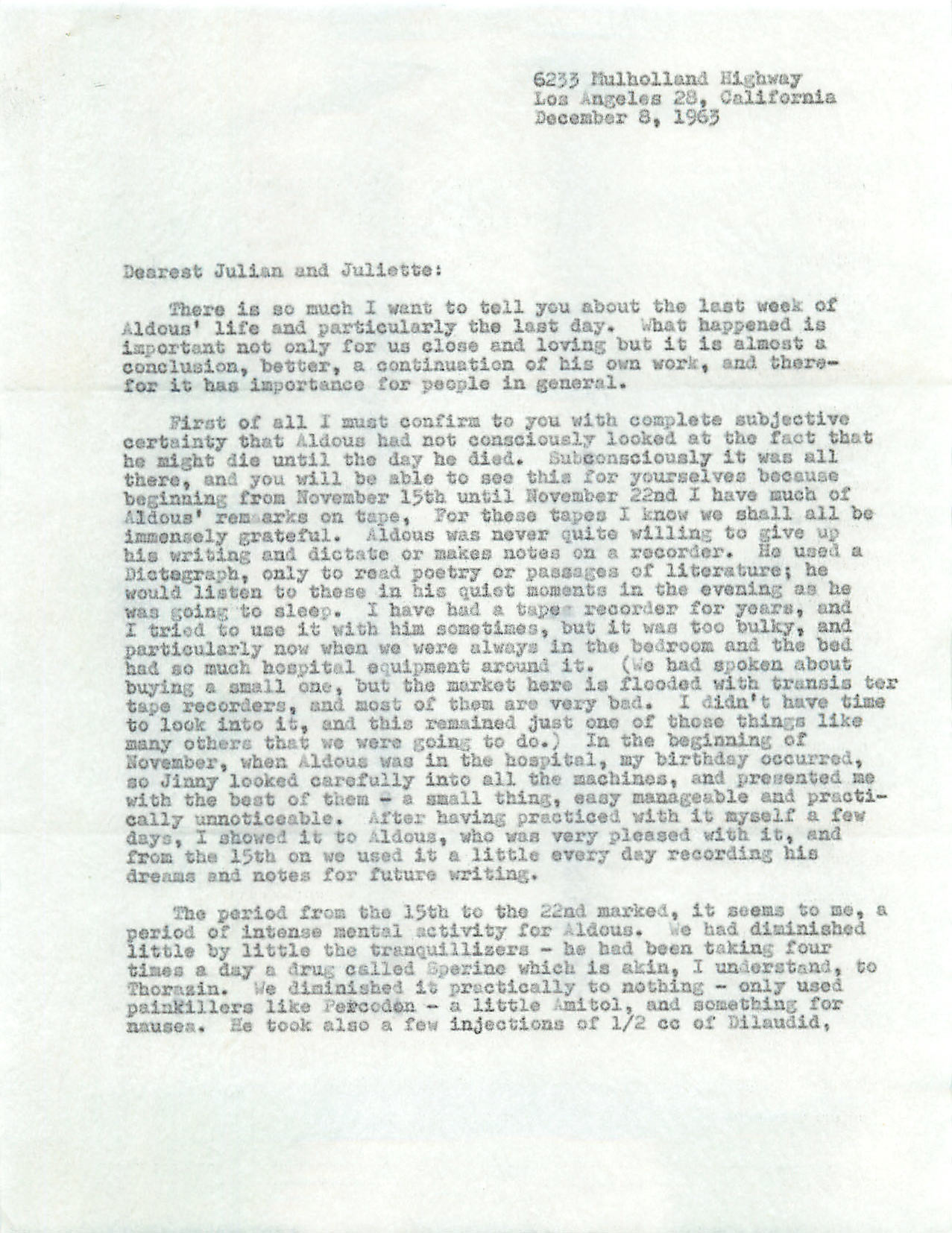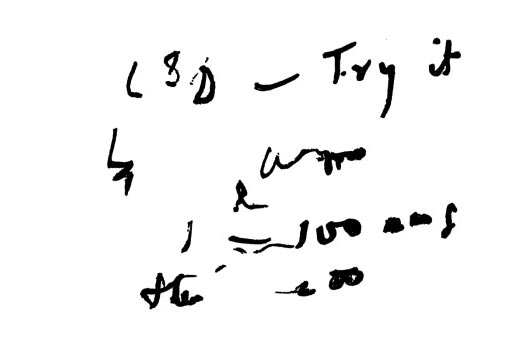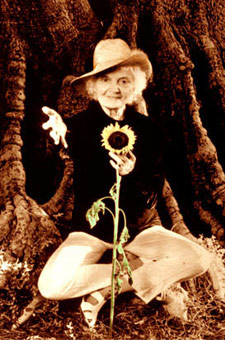From The Stolaroff Collection:
Laura Huxley's Letter on Aldous' Passing
Jul 2009
Citation: Erowid. "From The Stolaroff Collection: Laura Huxley's Letter on Aldous' Passing". Erowid.org. Jul 2009.
|

Al Hubbard, and Myron Stolaroff |
Jan. 20 '64
Dear Rita, Al and Myron,
I wanted to write you before this but circumstances prevented me. First I wish to thank you for your offer in those difficult days - and second I wish you to have the enclosed report of Aldous' last day - I have given it only to few close friends and relatives and you may let it be known only to those who are in immediate need of this knowledge and will use it well - otherwise you know well how it may be misused and misunderstood -
Wishing you well
Laura
6110 Graciosa Drive · Los Angeles 28, California
Jan. 20 '64
Dear Myron
Will you please forward this letter to Rita and Hal {Al} after you read it - and stop to see me next time you are here?
Cordially
Laura
Jan. 20 '64
Dear Myron
Will you please forward this letter to Rita and Hal {Al} after you read it - and stop to see me next time you are here?
Cordially
Laura

|
6233 Mulholland Highway
Los Angeles 28, California
December 8, 1963
Dearest Julian and Juliette:Los Angeles 28, California
December 8, 1963
There is so much I want to tell you about the last week of Aldous' life and particularly the last day. What happened is important not only for us close and loving but it is almost a conclusion, better, a continuation of his own work, and therefore it has importance for people in general.
First of all I must confirm to you with complete subjective certainty that Aldous had not consciously looked at the fact that he might die until the day he died. Subconsciously it was all there, and you will be able to see this for yourselves because beginning from November 15th until November 22nd I have much of Aldous' remarks on tape, For these tapes I know we shall all be immensely grateful. Aldous was never quite willing to give up his writing and dictate or makes notes on a recorder. He used a Dictograph, only to read poetry or passages of literature; he would listen to these in his quite moments in the evening as he was going to sleep. I have had a tape recorder for years, and I tried to use it with him sometimes, but it was too bulky, and particularly now when we were always in the bedroom and the bed had so much hospital equipment around it. (We had spoken about buying a small one, but the market here is flooded with transister tape recorders, and most of them are very bad. I didn't have time to look into it, and this remained just one of those things like many others that we were going to do.) In the beginning of November, when Aldous was in the hospital, my birthday occurred, so Jinny looked carefully into all the machines, and presented me with the best of them - a small thing, eas{il}y manageable and practically unnoticeable. {Erowid Note: Jinny was a friend of Laura's from before the time that Laura had taken psychedelics herself; Jinny helped inspire Laura to work with children, and later in her life Laura created the foundation Children: Our Ultimate Investment.} After having practiced with it myself a few days, I showed it to Aldous, who was very pleased with it, and from the 15th on we used it a little every day recording his dreams and notes for future writing.
The period from the 15th to the 22nd marked, it seems to me, a period of intense mental activity for Aldous. We had diminished little by little the tranquillizers he had been taking four times a day a drug called Sperine {Sparine/Promazine} which is akin, I understand, to Thorazin {Thorazine/Chlorpromazine}. We diminished it practically to nothing only used painkillers like Percodon {Percodan/asprin+oxycodone} a little Amitol {Amytal/amobarbital}, and something for nausea. He took also a few injections of 1/2 cc of Dilaudid, which is a derivative of morphine, and which gave him many dreams, some of which you will hear on the tape. The doctor says this is a small intake of morphine.
Now to pick up my point again, in these dreams as well as sometimes in his conversation, it seemed obvious and transparent that subconsciously he knew that he was going to die. But not once consciously did he speak of it. This had nothing to do with the idea that some of his friends put forward, that he wanted to spare me. It wasn't this, because Aldous had never been able to play a part, to say a single lie; he was constitutionall{y} unable to lie, and if he wanted to spare me, he could certainly have spoken to Jinny.
During the last two months I gave him almost daily an opportunity, an opening for speaking about death, but of course this opening was always one that could have been taken in two ways - either towards life or towards death, and he always took it towards life. We read the entire manual of Dr. Leary extracted from The Book of the Dead. He could have, even jokingly said don't forget to remind me his comment instead was only directed to the way Dr. Leary conducted his LSD sessions, and how he would bring people, who were not dead, back here to this life after the session. It is true he said sometimes phrases like, "If I get out of this," in connection to his new ideas for writing, and wondered when and if he would have the strength to work. His mind was very active and it seems that this Dilaudid had stirred some new layer which had not often been stirred in him.
The night before he died, (Thursday night) about eight o'clock, suddenly an idea occurred to him. "Darling," he said, "it just occurs to me that I am imposing on Jinny having somebody as sick as this in the house with the two children, this is really an imposition." Jinny was out of the house at the moment, and so I said, "Good, when she comes back I will tell her this. It will be a nice laugh." "No," he said with unusual insistence, "we should do something about it." "Well," I replied, keeping it light, "all right, get up. Let's go on a trip." "No", he said, "It is serious. We must think about it. All these nurses in the house. What we could do, we could take an apartment for this period. Just for this period." It was very clear what he meant. It was unmistakeably clear. He thought he might be so sick for another three of four weeks, and then he could come back and start his normal life again. This fact of starting his normal life occurred quite often. In the last three or four weeks he was several times appalled by his weakness, when he realized how much he had lost, and how long it would take to be normal again. Now this Thursday night he had remarked about taking an apartment with an unusual energy, but a few minutes later and all that evening I felt that he was going down, he was losing ground quickly. Eating was almost out of the question. He had just taken a few spoonsful of liquid and puree, in fact every time that he took something, this would start the cough. Thursday night I called Dr. Bernstein, and told him the pulse was very high - 140, he had a little bit of fever and whole feeling was one of immanence of death. But both the nurse and the doctor said they didn't think this was the case, but that if I wanted him the doctor would come up to see him that night. Then I returned to Aldous' room and we decided to give him an injection of Dilaudid. It was about nine o'clock, and he went to sleep and I told the doctor to come the next morning. Aldous slept until about two a.m. and then he got another shot, and I saw him again at six-thirty. Again I felt that life was leaving, something was more wrong than usual, although I didn't know exactly what, and a little later I sent you and Matthew and Ellen and my sister a wire. Then about nine a.m. Aldous began to be so agitated, so uncomfortable, so desperate really. He wanted to be moved all the time. Nothing was right. Dr. Bernstein came about that time and decided to give him a shot which he had given him once before, something that you give intravenously, very slowly - it takes five minutes to give the shot, and it is a drug that dilates the bronchial tubes, so that respiration is easier.
This drug made him uncomfortable the time before, it must have been three Fridays before, when he had that crisis I wrote you about. But then it helped him. This time it was quite terrible. He couldn't express himself but he was feeling dread{f}ul, nothing was right, no position was right. I tried to ask him what was occurring. He had difficulty in speaking, but he managed to say, "Just trying to tell you makes it worse." He wanted to be moved all the time - "Move me." "Move my legs." "Move my arms." "Move my bed." I had one of those push-button beds, which moved up and down both from the head and the feet, and incessantly, at times, I would have him go up and down, up and down by pushing buttons. We did this again, and somehow it seemed to give him a little relief. but it was very, very little.
All of a sudden, it must have been then ten o'clock, he could hardly speak, and he said he wanted a tablet to write on, and for the first time he wrote - "If I die," and gave a direction for his will. I knew what he meant. He had signed his will as I told you about a week before, and in this will there was a transfer of a life insurance policy from me to Matthew. We had spoken of getting these papers of transfer, which the insurance company had just sent, and that actually arrived special delivery just a few minutes before. Writing was very, very difficult for him. Rosalind and Dr. Bernstein were there trying also to understand what he wanted. I said to him, "Do you mean that you want to make sure that the life insurance is transferred from me to Matthew?" He said, "Yes." I said, "The papers for the transfer have just arrived, if you want to sign them you can sign them, but it is not necessary because you already made it legal in your will. He heaved a sigh of relief in not having to sign. I had asked him the day before even, to sign some important papers, and he had said, "Let's wait a little while," this, by the way, was his way now, for him to say that he couldn't do something. If he was asked to eat, he would say, "Let's wait a little while," and when I asked him to do some signing that was rather important on Thursday he said, "Let's wait a little while{.}" He wanted to write you a letter - "and especially about Juliette's book, is lovely," he had said several times. And when I proposed to do it, he would say, "Yes, just in a little while{,}" in such a tired voice, so totally different from his normal way of being. So when I told him that the signing was not necessary and that all was in order, he had a sigh of relief.
"If I die." This was the first time that he had said that with reference to NOW. He wrote it. I knew and felt that for the first time he was looking at this. About a half an hour before I had called up Sidney Cohen, a psychiatrist who has been one of the leaders in the use of LSD. I had asked him if he had ever given LSD to a man in this condition. He said he had only done it twice actually, and in one case it had brought up a sort of reconciliation with Death, and in the other case it did not make any difference. I asked him if he would advise me to give it to Aldous in his condition. I told him how I had offered it several times during the last two months, but he always said that he would wait until he was better. Then Dr. Cohen said, "I don't know. I don't think so. What do you think?" I said, "I don't know. Shall I offer it to him?" He said, "I would offer it to him in a very oblique way, just say 'what do you think about taking LSD [sometime again]?'" This vague response had been common to the few workers in this field to whom I had asked, "Do you give LSD in extremes?" ISLAND is the only definite reference that I know of. I must have spoken to Sidney Cohen about nine-thirty. Aldous' condition had become so physically painful and obscure, and he was so agitated he couldn't say what he wanted, and I couldn't understand. At a certain point he said something which no one here has been able to explain to me, he said, "Who is eating out of my bowl?" And I didn't know what this meant and I yet don't know. And I asked him. He managed a faint whimsical smile and said, "Oh, never mind, it is only a joke." And later on, feeling my need to know a little so I could do something, he said in an agonizing way, "At this point there is so little to share." Then I knew that he knew that he was going. However, this inability to express himself was only muscular - his brain was clear and in fact, I feel, at a pitch of activity.

|
After half an hour, the expression on his face began to change a little, and I asked him if he felt the effect of LSD, and he indicated no. Yet, I think that a something had taken place already. This was one of Aldous' characteristics. He would always delay acknowledging the effect of any medicine, even when the effect was quite certainly there, unless the effect was very, very st{r}ong he would say no. Now, the expression of his face was beginning to look as it did every time that he had the moksha medicine, when this immense expression of complete bliss and love would come over him. This was not the case now, but there was a change in comparison to what his face had been two hours ago. I let another half hour pass, and then I decided to give him another 100 mg {mics}. I told him I was going to do it, and he acquiesced. I gave him another shot, and then I began to talk to him. He was very quiet now; he was very quiet and his legs were getting colder; higher and higher I could see purple areas of cy{a}nosis. Then I began to talk to him, saying, "Light and free," Some of these thing I told him at night in these last few weeks before he would go to sleep, and now I said it more convincingly, more intensely - "go, go, let go, darling; forward and up. You are going forward and up; you are going towards the light. Willing and consciously you are going, willingly and consciously, and you are doing this beautifully; you are doing this so beautifully - you are going towards the light; you are going towards a greater love; you are going forward and up. It is so easy; it is so beautiful. You are doing it so beautifully, so easily. Light and free. Forward and up. You are going towards Maria's love with my love. You are going towards a greater love than you have ever known. You are going towards the best, the greatest love, and it is easy, it is so easy, and you are doing it so beautifully." I believe I started to talk to him - it must have been about one or two o'clock. It was very difficult for me to keep track of time. The nurse was in the room and Rosalind and Jinny and two doctors - Dr. Knight and Dr. Cutler. They were sort of far away from the bed. I was very, very near his ears, and I hope I spoke clearly and understandingly. Once I asked him, "Do you hear me?" He squeezed my hand. He was hearing me. I was tempted to ask more questions, but in the morning he had begged me not to ask any more question{s}, and the entire feeling was that things were right. I didn't dare to inquire, to disturb, and that was the only question that I asked, "Do you hear me?" Maybe I should have asked more questions, but I didn't.
Later on I asked the same question, but the hand didn't move any more. Now from two o'clock until the time he died, which was five-twenty, there was complete peace except for once. That must have been about three-thirty or four, when I saw the beginning of struggle in his lower lip. His lower lip began to move as if it were going to be a struggle for air. Then I gave the direction even more forcefully. "It is easy, and you are doing this beautifully and willingly and consciously, in full awareness, in full awareness, darling, you are going towards the light." I repeated these or similar words for the last three or four hours. Once in a while my own emotion would overcome me, but if it did I immediately would leave the bed for two or three minutes, and would come back only when I could dismiss my emotion. The twitching of the lower lip lasted only a little bit, and it seemed to respond completely to what I was saying. "Easy, easy, and you are doing this willingly and consciously and beautifully - going forward and up, light anf {and} free, forward and up towards the light, into the light, into complete love." The twitching stopped, the breat{h}ing became slower and slower, and there was absolutely not the slightest indication of contraction, of struggle. it was just that the breathing became slower - and slower - and slower, and at five-twenty the breathing stopped.
I had been warned in the morning that there might be some up-setting convulsions towards the end, or some sort of contraction of the lungs, and noises. People had been trying to prepare me for some horrible physical reaction that would probably occur. None of this happened, actually the ceasing of the breathing was not a drama at all, because it was done so slowly, so gently, like a piece of music just finishing in a sempre piu piano dolcemente. I had the feeling actually that the last hour of breathing was only the conditioned reflex of the body that had been used to doing this for 69 years, millions and millions of times. There was not the feeling that with the last breath, the spirit left. It had just been gently leaving for the last four hours. In the room the last four hours were two doctors, Jinny, the nurse, Rosalind [...] Roger [Go]pal - you know she is the great friend of Krishnamurti, and the directress of the school in Ojai for which Aldous did so much. They didn't seem to hear what I was saying. I thought I was speaking loud enough, but they said they didn't hear it. Rosalind and Jinny once in a while came near the bed and held Aldous' hand. These five people all said that this was the most serene, the most beautiful death. Both doctors and nurse said they had never seen a person in similar physical condition going off so completely without pain and without struggle.
We will never know if all this is only our wishful thinking, or if it is real, but certainly all outward signs and the inner feeling gave indication that it was beautiful and peaceful and easy.
And now, after I have been alone these few days, and less bombarded by other people's feelings, the meaning of this last day becomes clearer and clearer to me and more and more important. Aldous was, I think (and certainly I am) appalled at the fact that what he wrote in ISLAND [w]as not taken seriously. It was treated as a work of science fiction, when it was not fiction because each one of the ways of living he described in ISLAND was not a product of his fantasy, but something that had been tried in one place or another and some of them in our own everyday life. If the way Aldous died were known, it might awaken people to the awareness that not only this, but many other facts described in ISLAND are possible here and now. Aldous'asking for moksha medicine while dying is a confirmation of his work, and as such is of importance not only to us, but to the world. It is true we will have some people saying that he was a drug addict all his life and that he ended as one, but it is history that Huxley[]s stop ignorance before ignorance can stop Huxleys.
Even after our correspondence on the subject, I had many doubts about keeping Aldous in the dark regarding his condition. It seemed not just that, after all he had written and spoken about death, he should be let to go into it unaware. And he had such complete confidence in me - he might have taken it for granted that had death been near I certainly would have told him and helped him. So my relief at his sudden awakening at his quick adjusting is immense. Don't you feel this also.
Now, is his way of dying to remain our, and only our relief and consolation, or should others also benefit from it? What do you feel?



